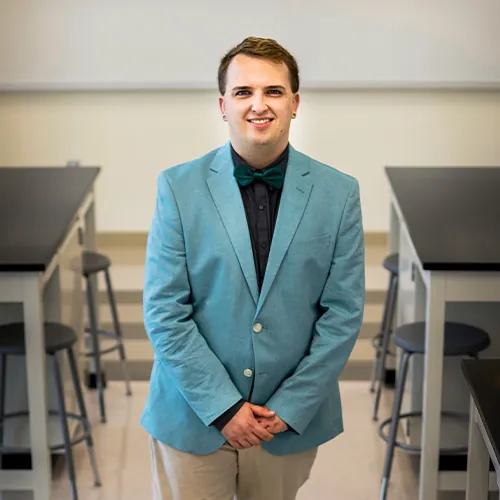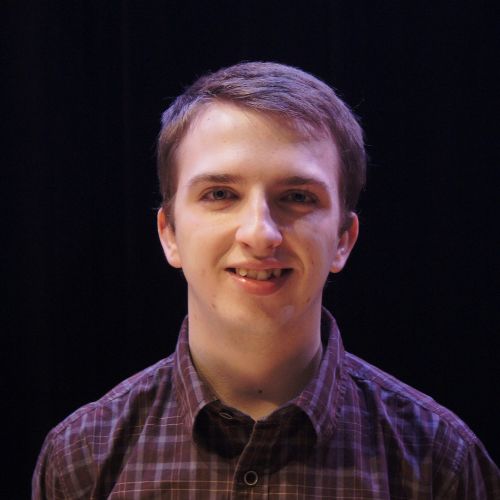A.A. Performing Arts 2015

The LGBTQ activist and public health advocate found perspective at OCC. As a performing arts major at OCC in 2014, Austin Greitz was required to take two semesters of a language. He chose American Sign Language. Years later, the LGBTQ activist and public health advocate credits those classes with giving him a new perspective on the world around him.
“It changed how I think about language,” said Greitz ‘15. “Formerly, I thought of language as written and spoken, but I learned that it could be visual, and movement.” The class also made him think more carefully about things like access and disability, teaching him to challenge his own viewpoint whenever he can.
“It’s about looking at things from a different perspective,” he said. “Realizing that maybe everything I see in the world is not all there is.”
That shift in perspective began soon after Greitz enrolled at OCC. Growing up in Ocean County, he always knew that community college was an option, but didn’t always believe it was the right one for him.
“The fact of the matter is, OCC was not my first choice,” Greitz said with a laugh. “I actually wanted to go as far away from home as possible.” When that wasn’t feasible, he enrolled at OCC and quickly learned that all his preconceived notions were wrong.
“I was really enjoying my classes, the students and teachers, so I asked myself, ‘why was I so against this?’” He decided to get more involved on campus, discovering new interests, and by the end of his first semester, he was prepared to take advantage of everything OCC could offer him.
Immersing himself on campus led Greitz to his involvement with OCC’s Gay-Straight Alliance (now Ocean Pride), a student-run club whose mission is to provide a supportive environment for LGBTQA+ students and their allies.
“It was really important to me, as a queer person, to bring awareness to my community and understanding to campus, and to have a space where we all feel like we can understand each other.”
The club gave Greitz the opportunity to address issues he was passionate about, and led to his plan to continue his studies at Montclair University after graduation. He is grateful to OCC for giving him the skills to look at things differently and be open to experiences beyond his own.
“The perspective from ASL really helped me at Montclair,” he said. “What other lenses can we use to look at the world? It really changed my worldview. I’m so glad I had the opportunity to do that.”
ASL instructor Saundra Piscitelli is happy that Greitz got so much out of taking her class. “The hope is always that there will be one less person who sees being deaf as a disability, as something that needs to be fixed, because it’s not,” she said. “Austin already had that in him.”
She remembers him as genuine, non-judgmental, open to learning and to discussion with others. “Austin was one of those students who took what I was teaching and ran with it. Being in a class where the information was being presented differently, I think maybe it sparked something within him.”
At Montclair, Greitz found his calling. “I was planning a theater major and LGBTQ studies minor,” he said. “Then I took my first class, and it opened my eyes to the fact that I could work within my community as a career.” As a volunteer at the campus’ LGBTQ center, he helped charter the first gender-inclusive multicultural fraternity to ensure that all gender identities have a place on campus. He also served as a peer educator, leading a campaign to raise awareness of HIV/AIDS resources and working with the University Health Center to develop new protocols for the HIV prevention medication PrEP, making it more accessible on college campuses. He also served as an intern at the Hudson Pride Center, an advocacy group for LGBTQ and HIV/AIDS communities in Jersey City.
After graduating, he worked at the Coalition on AIDS in Passaic County (CAPCO), linking clients to medical care and social services, and then at Planned Parenthood, where he worked with community action teams to ensure access to reproductive and sexual health care for NJ residents, before returning to clinic work, counseling patients in HIV prevention and connecting individuals to access to PrEP. “I loved the advocacy work,” he said, “but I missed not seeing people.”

That opportunity to connect with people was a key to Greitz’s success at OCC, one he thinks more students should consider when choosing a college. “Going from a class of 20 or 30 kids to lecture halls with 200+ students is a big jump. At OCC, you can develop a relationship with your professors. That makes a huge difference.” Greitz believes that personal attention helped set him up for the future, leaving him better prepared for success and even more thankful that his college experience began at OCC.
“It’s all about connection,” he said. “Especially in this world today. It’s scary! People need to feel that it’s OK to reach out for help. There are so many people in your community to help you out, if you just ask for it.”
In his current role, as a public health representative on the NJ Department of Health’s Communicable Disease team, Greitz now has what he calls the best of both worlds: analyzing the issues and also working directly with people—talking to them, providing support, and linking them to prevention and treatment options.
“It feels really great when I’m able to work with folks and get them the help that they need. It’s really rewarding, being able to make a difference in their lives.”
These days, he urges students to consider community college after high school. “I’m a big proponent of community college,” he said. “At OCC, I had the ability to explore my interests without it having to be a big deal if I changed my mind, and it was a great place to connect with peers. I really loved my experience there. I would not change it for anything.”
